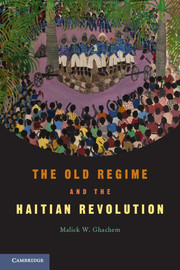Book contents
3 - Reconciling Humanity and Public Policy
Published online by Cambridge University Press: 05 June 2012
Summary
Well before the Revolution, the edicts of Louis XVI frequently spoke of natural law and the rights of man.
– Alexis de Tocqueville, The Old Regime and the French Revolution (1856)The transformations wrought by the Seven Years’ War in Saint-Domingue were decisive not only for manumission policy, but also for an area more conventionally associated with colonial administration in the tropics: plantation management and the treatment of slaves. The 1760s and 1770s witnessed a rising groundswell of attention to the theme of the “arbitrary” or “private” authority of slave masters in Saint-Domingue. The problem of the renegade or “barbarous” planter transcended the specific concerns and agendas of administrators, judges, and pamphleteers. Indeed, it became a preoccupation even for planters themselves, including the very ones whose conduct was most at issue. The “domestic sphere” of slavery in Saint-Domingue provided a coherent focal point around which a variety of different interests converged, occasionally to defend the absolutism of that sphere from within, but more often to criticize it from the outside.
As in the context of manumission, the legal and political debate over the “arbitrary” and “despotic” slave master proceeded from colonial “first principles” but very quickly devolved into a clash over consequences. Competing claims of sovereignty – on the one hand, royal authority as expressed in the Code Noir, and on the other, slaveholder notions of natural or domestic right – gave form to the debate. Yet what animated these abstract claims and made them genuinely salient was their perceived ability to forecast and help manage the hazards generated by plantation governance and master-slave relations. Where both manumission and the abuse of slaves were concerned, administrators believed they were on solid precautionary ground in seeking to limit the asserted prerogatives of the plantation complex. In the case of manumission, that strategic reasoning reflected fears that an overly populous and “licentious” free colored community would “corrupt” and subvert the racial and political hierarchies on which slave society was based – unless the path to freedom could be channeled instead, through military service, toward the containment of slave resistance. In the context of concerns about the arbitrary nature of plantation management, a different but not unrelated concern was at work: the belief that a small number of especially depraved and tyrannical colonists would jeopardize the viability of an entire colonial system by multiplying the incentives for a slave revolution. Montesquieu’s analysis of the “dangers” and “abuses” of slavery crystallized this problem for a colonial audience by questioning, in effect, whether a slave had any incentive to tolerate the abuses of plantation life if that life was worse than the consequences of its overthrow.
- Type
- Chapter
- Information
- The Old Regime and the Haitian Revolution , pp. 121 - 166Publisher: Cambridge University PressPrint publication year: 2012



